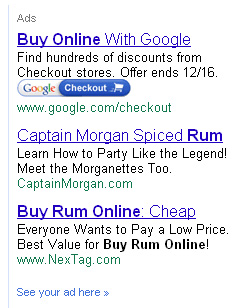Google has made changes to its advertising policy on alcohol for AdWords. The company now allows ads to promote the sale of hard alcohol and liquor.
Over two years ago, Google revised its alcohol policy from not allowing alcohol ads to begin permitting beer, champagne, and wine ads. A couple months later the company revised its policy again to allow the promotion of hard liquors and liqueurs. Now Google has revised it once again.
 "Since then, hard alcohol advertisers have been able to promote websites that offer information about their brand, their products, or drinks that can be made with their products," explains Dan Friedman of Google’s Inside AdWords crew. "Now, they can also promote websites that sell hard alcohol online, direct users to retailers where their products are sold, or feature sales promotions."
"Since then, hard alcohol advertisers have been able to promote websites that offer information about their brand, their products, or drinks that can be made with their products," explains Dan Friedman of Google’s Inside AdWords crew. "Now, they can also promote websites that sell hard alcohol online, direct users to retailers where their products are sold, or feature sales promotions."
"To comply with the policy, the ad and website must abide by certain advertising restrictions, including (but not limited to) not targeting minors, not implying that drinking alcohol provides certain advantages, and not showing inappropriate content," adds Friedman. "They are also subject to any further restrictions in the countries that they target."
The exact criteria are:
– do not target minors
– do not include endorsements from athletes, cartoon characters, or any other icons/people appealing to minors
– landing page must have an age gate and include statements about drinking responsibly
– do not imply that drinking alcohol can improve sexual, social, or professional standings
– do not imply that drinking alcohol is relaxing or therapeutic
– do not indicate that drinking alcohol in excess is good
– do not show people consuming alcohol while doing anything illegal, violent, or dangerous; or being inappropriate in other ways, such as acting in a degrading manner
– do not contain sexual content
Google says it made the changes simply to "help more advertisers use AdWords for the promotion of their products."




 WebProNews is an iEntry Publication
WebProNews is an iEntry Publication